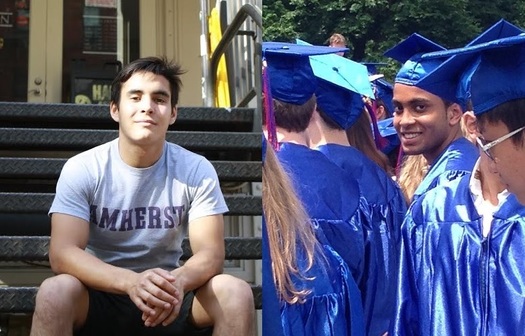Amherst Supplemental Essays
By Anton Kliot
Amherst gave applicants the opportunity to respond to a quotation in an essay of not more than 300 words. The instructions stated, "It is not necessary to research, read, or refer to the texts from which these quotations are taken; we are looking for original, personal responses to these short excerpts. Remember that your essay should be personal in nature and not simply an argumentative essay."
Anton chose the following quote: "Rigorous reasoning is crucial in mathematics, and insight plays an important secondary role these days. In the natural sciences, I would say that the order of these two virtues is reversed. Rigor is, of course, very important. But the most important value is insight--insight into the workings of the world. It may be because there is another guarantor of correctness in the sciences, namely, the empirical evidence from observation and experiments."
Kannan Jagannathan, Professor of Physics, Amherst College
Sitting in the shade of a tree in Central Park with two close friends, I absentmindedly pick up a fallen leaf and begin crumpling it in my hands. With that, a seed begins to form in my mind. As I look at the tree overhead, I think of the immense amount of solar energy necessary to its growth--yet this leaf could disintegrate into debris with little energy input.
I look up at a crumbling, pre-war building a hundred meters away. Hours, days, months, even, of manual labor and tons of fossil fuels had gone into its construction; yet it would take only time and the persuasion of the elements to break down into dust. This, I realize, is free energy in action. To build things, natural or man-made, to move from chaos towards structure, requires energy. However, it is the tendency of the world-the universe even--to regress towards disorder.
When my professor initially taught the concept of free energy, I was perplexed. I vaguely understood that entropy stood for chaos, and enthalpy for energy, but beyond that I was stumped. What were these values? And why did they determine the spontaneity of reactions? I learned the equations provided, and how to tackle basic problems, but without grasping entropy's role in the reactions of the world around me I found true understanding of the concept elusive.
The power of insight lives in its ability to grow outside of the normative places where we expect to foster revelations, such as classes and labs. Ultimately, it was that day in the park, as much as any classroom experience, that bolstered my understanding. My passion for chemistry comes not from solving equations, but from the insight into the workings of the world I have gained, both in and out of the lab.
Duke Supplemental Essays
By Calvin Thompson
1.) Please discuss why you consider Duke a good match for you. Is there something in particular at Duke that attracts you? (Please limit your response to no more than 150 words.)
I love many things, but learning and sports top the list. The moment I stepped onto Duke's campus, I leaned over to my mother, gasping, and said, "Whoa," even before beginning my tour. I was stunned to immediately see signs of my loves everywhere. My dreams of tenting in K-Ville for the annual Duke-UNC game almost made my mouth water. As for learning, the cross-disciplinary study options that Duke offers ignite my passions. I have always loved business, and as I have aged, I discovered a deep interest in education. At Duke, I saw the opportunity to combine these two interests in many ways. I would love to initiate lunches with Professor Elizabeth Garcia, whose work focuses on educational motivation, and Mark T. Brown, Director of the Management Communications Center. Exploring commonalities in business and educational spheres would be uplifting, and will engage all of my most profound interests.
2.) Please discuss one of your extracurricular activities that has required a particularly significant time commitment or that has played a meaningful role in your personal development. (Please limit your response to no more than 150 words.)
I struggled academically in middle school. So, in my sophomore year of high school, I started a tutoring program for 6-8th grade African-American and Latino students, who, like me at their age, were experiencing difficulties in school. I noticed at the high school level, I was among a tiny number of students of color taking honors and advanced classes. However, this problem clearly started earlier. To solve it, I thought about what I wished I had in middle school: privacy and attention. I provided this so my students could receive help without feeling like they were "idiots" compared to their peers. Since beginning the program, I have tutored the same kids for 3 years. All my students have improved their grades and are on track for honors level classes in high school. Watching them work hard and succeed has been the most gratifying experience of my life thus far.
